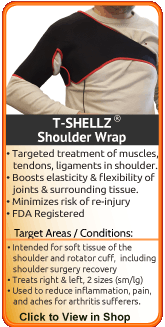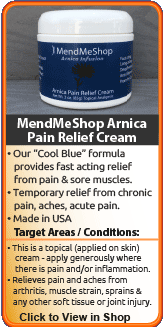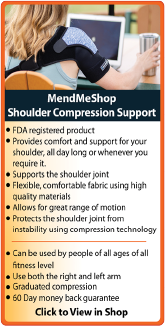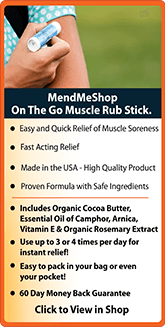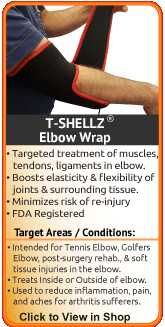|
| Common Rotator Cuff Injuries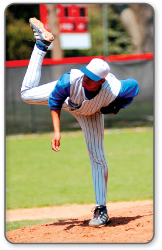 Inflammation of your rotator cuff tendons or bursa will produce redness, swelling, and soreness in your shoulder soft tissue. Tendonitis is often due to overuse or repetitive actions common in athletes or workers who use frequent overhead arm movements such as throwing a ball, swinging a racquet, swimming, lifting weights, dusting high shelves, painting, or completing manual labor tasks. Decreased space in your rotator cuff will result from the above, as well as from anatomical differences in the shape of your shoulder bone, or arthritis. These will trigger pain, limit the use of your shoulder, and can lead to chronic tendinitis. This condition is often referred to as Swimmer's shoulder, Pitcher's shoulder, Tennis Shoulder, or Shoulder impingement syndrome. Rotator Cuff InstabilityA muscle strength and flexibility imbalance or weakness, can cause instability and result in a subluxation or partial dislocation (your shoulder bones slide in and out of their sockets) or a full dislocation (the head of the arm bone slips out of the shoulder socket). These can cause a lot of pain and discomfort in your rotator cuff soft tissue. People with frequent dislocations often require surgery. Shoulder instability which may have been present since birth or due to an injury, can also occur over time from over-straining, poor posture or inactivity. The rotator cuff is overworked, becomes weak and has difficulties stabilizing your shoulder, which in turn causes inflammation. If your rotator cuff becomes weak and tired, the head of your arm bone can squash up against the acromion and can result in a tear. This is often a major cause of rotator cuff tears in individuals over 40 years of age. Rotator Cuff Strains or TearsAs you age, chronic degeneration can occur from repetitive motions breaking down the soft tissue and collagen (a fibrous connective tissue) in your rotator cuff. Degeneration may be caused by the development of calcium deposits, arthritic bone spurs or poor posture causing the acromion to rub on tendons or other soft tissue. 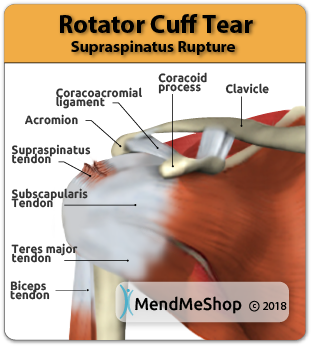 Rough or repetitive arm movements, especially when your shoulder is lifted to the limit of its natural range of motion, can weaken the tendons already experiencing tendonitis. This can lead to a tear in your tendon or muscle that is often difficult to repair surgically. Imagine your favorite jeans wearing out; they get more and more worn until the edges fray or a hole appears. A rotator cuff acute trauma results from a sudden injury such as falling onto an outstretched arm, which can bruise, strain or tear your rotator cuff tendon or muscle at any age. Excessive force exerted by lifting or pulling something too heavy, pushing off an object vigorously with your arm, or making a forceful and abrupt forward throwing or overhead action, can also severely damage and tear your rotator cuff. Rotator cuff injuries can also happen in conjunction with other shoulder injuries such as a fracture. Types of Rotator Cuff TearsA partial thickness tear of your tendon or muscle is not torn all the way through. This is related to chronic inflammation or impingement which results from the development of spurs on the underside of the Acromion (often require surgery to remove the bone spur). A full thickness or complete tear is torn all the way through your tendon or muscle. This generally results from acute or sudden injuries, ongoing impingement, or degeneration of partial thickness tears. A tendon torn from the bone often results from a traumatic injury or degeneration. Rotator Cuff Scar TissueScar tissue will often develop as a result of a major rotator cuff injury, tendinitis, shoulder instability and other rotator cuff injuries once acute inflammation begins to decrease. As your damaged shoulder tissues heal this dead, fibrotic tissue will develop instead of forming brand new tissue. This tissue adheres to your muscle fibers, tendons, ligaments, fascia, nerves and joints preventing them from moving properly and limiting your range of motion, flexibility and strength. The amount of scar tissue you develop will depend on the size, depth and location of your injury, as well as your age and current health. Leaving your scar tissue untreated may lead to future shoulder conditions and injuries such as, frozen shoulder, arthritis, tendon tears, or impingement due to a thickening of the tissue in the subacromial space. Learn More About The Rotator CuffLearn more about Shoulder Surgery and Post-Surgery Recovery Learn more about The TShellz Wrap Learn more about which is better for your rotator injury - ice or heat FREE SHIPPING ON ALL PRODUCTS CURRENTLY ENABLED |
|

